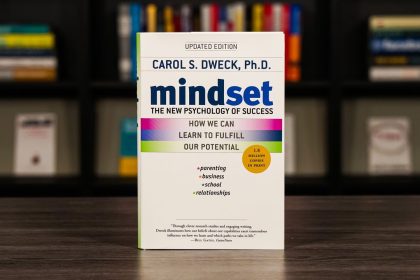In “Mindset: The New Psychology of Success,” pioneering psychologist Carol S. Dweck explores how mindset shapes our lives. Drawing upon years of research and experience from her fieldwork with fixed and growing mindsets respectively, Dweck introduces these concepts and shows their impactful relationship between our mentalities (fixed vs growing mindsets) and relationships, success, well-being, etc. She offers real-life examples as well as strategies that readers can implement to adopt growth mentalities and unlock their potential while taking challenges as opportunities to enhance growth.
In this book, Dweck defines two different mindsets: fixed and growth. People with a fixed mindset believe their intelligence and abilities remain static over time while those who adopt a growing mindset see them as qualities that can be developed with dedication and effort.
Carol S. Dweck’s “Mindset: The New Psychology of Success” is an unforgettable book that challenges traditional notions of achievement and intelligence. Dweck provides evidence through studies and stories to show us the crucial role our mindsets have on success and happiness. Her concept of growth versus fixed mindsets provides an insightful framework for comprehending motivation and human behavior.
“Mindset” is notable due to its practical approach. Dweck not only covers the theory behind mindsets but also provides concrete strategies on how we can foster a growth mindset in ourselves and other people alike. She offers actionable tips for anyone aspiring to foster an atmosphere of excellence and growth within any institution, including parents or educators.
Dweck’s book offers an important message: We can develop our abilities with hard work and determination. This concept can be both liberating and empowering, encouraging individuals to persevere despite facing difficulties. Dweck encourages her readers to embrace life with resilience and courage by seeing failure as part of the natural learning process.
Dweck emphasizes the crucial role feedback and praise play in shaping mindsets, providing us with an important tool in encouraging a growth mentality in others by rewarding effort over intelligence. Doing this fosters learning and improvement as well as encourages resilience among recipients of constructive criticism that emphasizes progress rather than inherent ability.
“Mindset: the New Psychology of Success” should be read by anyone looking to reach their maximum potential and succeed more in life. Carol Dweck offers not just eye-opening insights but also actionable steps for cultivating an attitude of growth while accepting obstacles as opportunities for personal improvement. This book could transform your life whether you are an aspiring parent, professional, student, or simply curious.
Key points:
The Power of Mindset
Dweck distinguishes between two primary mindsets: fixed and growth. Those with a fixed mindset believe that their abilities and intelligence are static traits, while those with a growth mindset see them as qualities that can be developed through dedication and effort.
Impact on Success
Our mindset significantly influences our approach to challenges, failures, and successes. Individuals with a growth mindset are more resilient, eager to learn from setbacks, and willing to put in the effort to improve, ultimately leading to greater success in various aspects of life.
Nurturing Growth Mindset
Dweck provides insights into how parents, educators, and leaders can foster a growth mindset in themselves and others. Praising effort over intelligence, offering constructive feedback, and promoting a culture that values learning and development are key strategies in cultivating a growth mindset.
Embracing Challenges
Rather than fearing failure, individuals with a growth mindset view challenges as opportunities for growth and learning. They are more likely to persevere in the face of obstacles and see setbacks as temporary setbacks rather than permanent limitations.
Transformative Potential
By adopting a growth mindset, individuals can unlock their full potential and achieve greater success in academics, career, relationships, and personal development. Cultivating a belief in the power of effort and resilience empowers individuals to overcome obstacles and pursue their goals with confidence.



